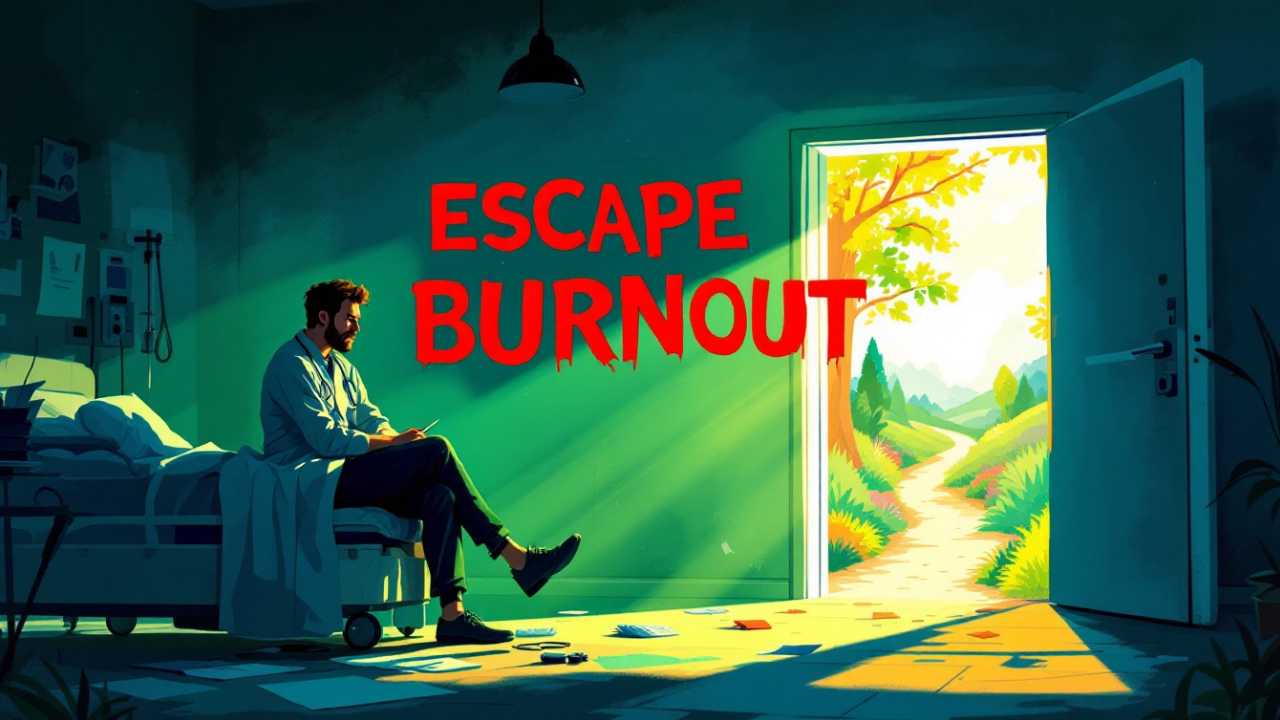The Art of Letting Go: Why Control is an Illusion That's Holding You Back

How often do you lay awake at 2 AM, replaying a conversation with a difficult colleague? Or find yourself checking your phone obsessively, waiting for a response that may never come?
As physicians, we're trained to take charge, solve problems, and heal. It's what makes you excellent doctor. It is also why you are laying awake at 2 AM trying to solve world hunger or will your son to pick up his room. It is exhausting when you try to apply that same level of control to every aspect of your life.
Here's what I've learned: the things that stress you out the most are usually the things you have the least control over.
Things like:
- Your patient's compliance with a treatment plan.
- Your colleague's attitude during morning rounds.
- Your teenager's choice of friends.
Your partner's mood after a long day.
The frustrating part is that the more tightly you hold onto these uncontrollables, the more control they have over you. And the more energy you waste trying to manage them, the less you have for the things that actually matter and that you can influence.
What if I told you that letting go isn't giving up? It's actually the most powerful thing you can do.
When you stop trying to control things you can't, you free up mental and emotional energy to focus on your responses, your choices, and your growth.
You can't control whether your patient follows your advice, but you can control how clearly you communicate it. You can't control your colleague's negativity, but you can control whether you let it affect your attitude. You can't control every outcome in your personal relationships, but you can control how you show up.
So, take a minute and ask yourself “Where am I spending energy trying to control things that are ultimately outside my influence? What is possible if I redirect that energy toward something else?
You have power over your mind - not outside events. Realize this, and you will find strength.
— Marcus Aurelius, Meditations
Coach's Corner
This week, I want to introduce you to a powerful tool called the "Let Them" mantra. This practice will help you identify what's outside your control and find peace in releasing it.
Step 1: Identify Your "Control Struggles"
Take 10 minutes to write down three situations that have been causing you stress lately. For each situation, complete this sentence:
"I wish _______ would _______."
Examples:
- "I wish my teenage daughter would make better choices."
- "I wish my colleague would stop being so negative."
- "I wish my patients would follow my recommendations."
Step 2: Apply the "Let Them" Mantra
For each situation, reframe it using "Let them":
- "Let my daughter make her own choices and learn from the consequences."
- "Let my colleague be negative. That's their choice, not my responsibility."
- "Let my patients decide their own level of compliance."
Step 3: Establish Your Boundaries and Responses
For each "Let them" statement, identify:
What you CAN control (your response):
- How you communicate
- What boundaries you set
- How you show up
What consequences you'll allow:
- Natural consequences they'll experience
- Boundaries you'll maintain
- Support you'll offer, maintain, or withdraw
Resources you'll provide (showing you care within limits):
- Information you'll share
- Support you'll offer without attachment to outcome
- Love you'll give without conditions
Here is an example in action:
Situation:Your adult child keeps making poor financial decisions and asking for money.
Let Them: Let them make their financial mistakes and experience the consequences."
Your Response:
- What you CAN control: You can listen with empathy, offer financial education resources once, and clearly communicate your boundaries around lending money.
- Consequences you'll allow: Let them experience the natural consequences of their choices - late fees, credit impacts, or having to find alternative solutions.
- Resources you'll provide: Emotional support through listening, a one-time conversation about budgeting, and unconditional love that isn't tied to their financial success.
Your Weekly Practice:
Each morning this week, choose one "Let them" statement to focus on. When you notice yourself trying to control that situation, gently remind yourself: "Let them." Then redirect your energy to something within your control like your response, your boundaries, or your own well-being.
Notice how this shift feels in your body. Does your jaw unclench? Do your shoulders drop? This physical release is your nervous system recognizing the relief that comes with letting go.
Ready to Release What's Weighing You Down?
If you've been carrying the weight of trying to control everything and everyone around you, you don't have to figure this out alone. The physician mindset is strong, and sometimes we need support to identify where we're holding on too tightly.
In a free 30-minute coaching consultation, we can explore:
- The specific areas where you're expending energy on uncontrollable outcomes
- How your need for control might be impacting your relationships and well-being
- Practical strategies for redirecting that energy toward what truly matters
- Ways to maintain high standards while releasing attachment to others' choices
You've spent years learning to think like a physician. Now it's time to learn the equally important skill of strategic letting go.
Book Your Free Consultation Here
To being a little less in control,
Ben
|
 |
Ace Your Medical School Interviews: A Guide for Premeds - The ... Discover tips to ace your med school interviews. Actional advice for premedical students for interview prep. thedevelopingdoctor.com |








Responses